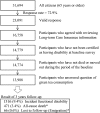Green tea consumption and the risk of incident functional disability in elderly Japanese: the Ohsaki Cohort 2006 Study
- PMID: 22277550
- PMCID: PMC3278248
- DOI: 10.3945/ajcn.111.023200
Green tea consumption and the risk of incident functional disability in elderly Japanese: the Ohsaki Cohort 2006 Study
Abstract
Background: Previous studies have reported that green tea consumption is associated with a lower risk of diseases that cause functional disability, such as stroke, cognitive impairment, and osteoporosis. Although it is expected that green tea consumption would lower the risk of incident functional disability, this has never been investigated directly.
Objective: The objective was to determine the association between green tea consumption and incident functional disability in elderly individuals.
Design: We conducted a prospective cohort study in 13,988 Japanese individuals aged ≥65 y. Information on daily green tea consumption and other lifestyle factors was collected via questionnaire in 2006. Data on functional disability were retrieved from the public Long-term Care Insurance database, in which subjects were followed up for 3 y. We used Cox proportional hazards regression analysis to investigate the association between green tea consumption and functional disability.
Results: The 3-y incidence of functional disability was 9.4% (1316 cases). The multiple-adjusted HR (95% CI) of incident functional disability was 0.90 (0.77, 1.06) among respondents who consumed 1-2 cups green tea/d, 0.75 (0.64, 0.88) for those who consumed 3-4 cups/d, and 0.67 (0.57, 0.79) for those who consumed ≥5 cups/d in comparison with those who consumed <1 cup/d (P-trend < 0.001).
Conclusion: Green tea consumption is significantly associated with a lower risk of incident functional disability, even after adjustment for possible confounding factors.
Figures
Similar articles
-
Green Tea Consumption and the Risk of Incident Dementia in Elderly Japanese: The Ohsaki Cohort 2006 Study.Am J Geriatr Psychiatry. 2016 Oct;24(10):881-9. doi: 10.1016/j.jagp.2016.07.009. Epub 2016 Jul 18. Am J Geriatr Psychiatry. 2016. PMID: 27594507
-
Association of coffee, green tea, and caffeine with the risk of dementia in older Japanese people.J Am Geriatr Soc. 2021 Dec;69(12):3529-3544. doi: 10.1111/jgs.17407. Epub 2021 Oct 8. J Am Geriatr Soc. 2021. PMID: 34624929
-
Green tea consumption is associated with lower psychological distress in a general population: the Ohsaki Cohort 2006 Study.Am J Clin Nutr. 2009 Nov;90(5):1390-6. doi: 10.3945/ajcn.2009.28214. Epub 2009 Sep 30. Am J Clin Nutr. 2009. PMID: 19793850
-
Green tea consumption and gastric cancer risk: an evaluation based on a systematic review of epidemiologic evidence among the Japanese population.Jpn J Clin Oncol. 2012 Apr;42(4):335-46. doi: 10.1093/jjco/hys009. Epub 2012 Feb 27. Jpn J Clin Oncol. 2012. PMID: 22371426
-
Impact of Green Tea Consumption on the Prevalence of Cardiovascular Outcomes: A Systematic Review.Cureus. 2023 Dec 1;15(12):e49775. doi: 10.7759/cureus.49775. eCollection 2023 Dec. Cureus. 2023. PMID: 38161525 Free PMC article. Review.
Cited by
-
The role of nutraceuticals as a complementary therapy against various neurodegenerative diseases: A mini-review.J Tradit Complement Med. 2020 Apr 1;10(5):434-439. doi: 10.1016/j.jtcme.2020.03.008. eCollection 2020 Sep. J Tradit Complement Med. 2020. PMID: 32953558 Free PMC article. Review.
-
Association between tea consumption and risk of cognitive disorders: A dose-response meta-analysis of observational studies.Oncotarget. 2017 Jun 27;8(26):43306-43321. doi: 10.18632/oncotarget.17429. Oncotarget. 2017. PMID: 28496007 Free PMC article.
-
Tea consumption and physical function in older adults: a cross-sectional study.J Nutr Health Aging. 2014;18(2):161-6. doi: 10.1007/s12603-013-0354-7. J Nutr Health Aging. 2014. PMID: 24522468
-
Education level and incident functional disability in elderly Japanese: The Ohsaki Cohort 2006 study.PLoS One. 2019 Mar 12;14(3):e0213386. doi: 10.1371/journal.pone.0213386. eCollection 2019. PLoS One. 2019. PMID: 30861035 Free PMC article.
-
Tea consumption and risk of bone health: an updated systematic review and meta-analysis.J Bone Miner Metab. 2024 Jan;42(1):99-114. doi: 10.1007/s00774-023-01479-y. Epub 2023 Dec 6. J Bone Miner Metab. 2024. PMID: 38057603
References
-
- Kuriyama S, Shimazu T, Ohmori K, Kikuchi N, Nakaya N, Nishino Y, Tsubono Y, Tsuji I. Green tea consumption and mortality due to cardiovascular disease, cancer, and all causes in Japan: the Ohsaki study. JAMA 2006;296:1255–65 - PubMed
-
- Watanabe I, Kuriyama S, Kakizaki M, Sone T, Ohmori-Matsuda K, Nakaya N, Hozawa A, Tsuji I. Green tea and death from pneumonia in Japan: the Ohsaki cohort study. Am J Clin Nutr 2009;90:672–9 - PubMed
-
- Kuriyama S, Hozawa A, Ohmori K, Shimazu T, Matsui T, Ebihara S, Awata S, Nagatomi R, Arai H, Tsuji I. Green tea consumption and cognitive function: a cross-sectional study from the Tsurugaya Project 1. Am J Clin Nutr 2006;83:355–61 - PubMed
-
- Niu K, Hozawa A, Kuriyama S, Ebihara S, Guo H, Nakaya N, Ohmori-Matsuda K, Takahashi H, Masamune Y, Asada M, et al. Green tea consumption is associated with depressive symptoms in the elderly. Am J Clin Nutr 2009;90:1615–22 - PubMed
-
- Hozawa A, Kuriyama S, Nakaya N, Ohmori-Matsuda K, Kakizaki M, Sone T, Nagai M, Sugawara Y, Nitta A, Tomata Y, et al. Green tea consumption is associated with lower psychological distress in a general population: the Ohsaki Cohort 2006 Study. Am J Clin Nutr 2009;90:1390–6 - PubMed
Publication types
MeSH terms
Substances
LinkOut - more resources
Full Text Sources
Medical


